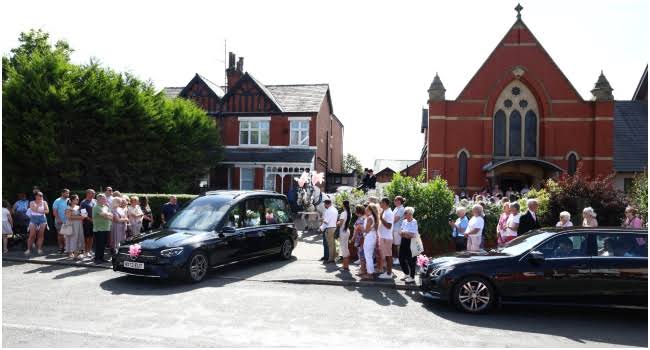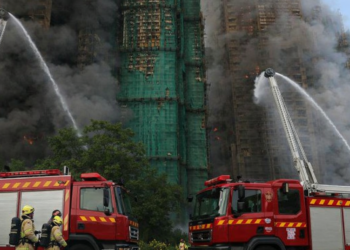Hundreds of mourners gathered Sunday in Southport, northwest England, for the funeral of nine-year-old Alice da Silva Aguiar, whose tragic death in a knife attack last month ignited a week of nationwide unrest.
Family, friends, community leaders, and emergency responders united in grief at a Catholic church ceremony, a solemn occasion marked by a show of communal support. Attendees wore white, in adherence to the Portuguese customs for honoring the bereaved, the home country of Alice’s parents.
As the funeral cortege, bearing a small white coffin, carried by a horse-drawn carriage adorned with colorful feathers—passed by, locals demonstrated their solidarity with applause as a deep sense of communal grief and support. This act of communal mourning explains the deep impact of Alice’s death on the local community.

Pink ribbons and balloons decorated the area near the church, in a show of the collective grief and tribute to the young girl. Inside the church, several hundred people attended the service, which included addresses, readings, prayers, and hymns. Those unable to enter the church were able to follow the proceedings via loudspeakers set up outside.
Headteacher Jinnie Payne delivered a poignant tribute, expressing the indelible mark Alice left on her school and community with the words, “Alice, you will forever be in our hearts.”
The attack on July 29 at a Taylor Swift-themed dance class resulted in the deaths of Alice and two other young girls—Bebe King, six, and Elsie Dot Stancombe, seven—while ten others, including eight children, were injured. Although all the injured have been released from hospital, the emotional scars of the incident remain.
In the wake of the stabbing, Southport and other towns and cities across England, as well as Northern Ireland, experienced rioting and violence, largely fueled by far-right extremists and opportunists. These groups exploited the tragedy to advance their anti-immigration and anti-Muslim agendas, exacerbating the chaos. Misinformation quickly spread online, falsely alleging that the perpetrator was a Muslim immigrant, further inflaming tensions.
The accused, Axel Rudakubana, a British-born individual with Rwandan heritage, faces charges of murder and attempted murder. Despite speculation and inflammatory rhetoric, authorities have confirmed that the attack is not being treated as terrorism-related. The motive remains undisclosed, but the incident has underscored the broader societal issues surrounding immigration, community cohesion, and the exploitation of tragedies for extremist purposes.
This tragic event has not only devastated a community but also highlighted the ongoing challenges of navigating social tensions and combating misinformation in a polarized society.

















